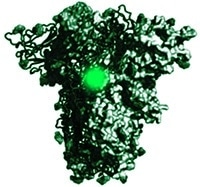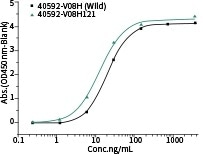In the past few months, new variants of the SARS-CoV-2 virus have emerged. The Alpha, Gamma, Beta, Delta and the latest Omicron are specifically concerning due to their high prevalence.
A subset of the mutations found in the RBD domain of the spike protein takes place in more than one strain. Such convergent mutations are of great interest since they might be behind the high transmissibility. Sino Biological has come up with RBD and Spike proteins of such variants.

Image Credit: Sino Biological Inc.
Furthermore, in such strains, the mutations take place in the nucleocapsid protein, which generally serves as the biomarker in rapid antigen tests. It is crucial to evaluate if the present commercial antigen tests have the ability to detect the mutated N proteins with similar specificity and sensitivity as their WT counterpart.
The WHO has been monitoring the progress of SARS-CoV-2 and reported these Variants of Concern (VOCs) to expedite the world to make rapid response to the ongoing COVID-19 pandemic.
Listed below are the possible characteristics of VOCs:
- An increase in the transmissibility or harmful change in COVID-19 epidemiology
- A reduction in the effectiveness of public health and social measures or available diagnostics, therapeutics and vaccines
- An increase in the virulence or alteration in clinical disease presentation
Table 1. WHO-currently designated Variants of Concern. Source: Sino Biological Inc.
| WHO label |
lineages |
Earliest documented samples |
| Alpha |
B.1.1.7 |
United Kingdom, Sep-2020 |
| Beta |
B.1.351 |
South Africa, May-2020 |
| Gamma |
P.1 |
Brazil, Nov-2020 |
| Delta |
B.1.617.2 |
India, Oct-2020 |
| Omicron |
B.1.1.529 |
Multiple countries, Nov-2021 |
Sino Biological has come up with a panel of recombinant RBD or Spike and nucleocapsid protein variants that can help assess the efficacy of the vaccination and antibodies.
Table 2. WHO-currently designated Variants of Interest. Source: Sino Biological Inc.
| WHO label |
lineages |
Earliest documented samples |
| Lambda |
C.37 |
Peru, Dec-2020 |
| Mu |
B.1.621 |
Colombia, Jan-2021 |
Omicron Variant
The new Omicron Variant spike protein contains more than 30 mutations. There is an urgent need to determine whether these mutations enable the Omicron variant to evade neutralizing antibodies.


Mutations in the spike glycoprotein of Omicron. Image Credit: Stanford University Coronavirus Database
A panel of previously established spike antibodies was screened and one mAb was identified, clone 40592-MM117, which reacted strongly with the Omicron spike protein. Another antibody exhibited moderate reactivity against the variant. All other clones that were tested, including various broad-spectrum ACE2-competing neutralizing antibodies, were not found to bind with the mutant.
Clone 40592-MM117 exhibits non-ACE2 competing neutralizing activity not only against the original strain but also against the Delta variant. A surprising finding was that the other mAb which was found to be Omicron-reactive also exhibits non-ACE2 binding neutralizing activity against earlier strains. The same clones are now being tested to see whether they can also neutralize the Omicron variant.
Sino Biological has come up with recombinant Omicron Spike RBD Protein and anti-Omicron antibody to aid in the study of Omicron variants. More Omicron antigens are coming soon, such as S1, B.1.1.529 S-ECD and Nucleocapsid.
Data illustration of antibodies and Omicron mutants
Omicron spike antibody
SARS-CoV-2 Spike Antibody, Omicron Reactive, Mouse MAb
Cat: 40592-MM117
- Ability to recognize Omicron spike protein: The 40592-MM117 clone exhibited strong reactivity with the Omicron spike protein.
Table 1. Source: Sino Biological Inc.
| Cat# |
ACE2
Competing |
Neutralizing Activity |
WT |
Delta |
Omicron |
| 40592-MM117 |
|
 |
 |
 |
 |
| 40592-R505 |
|
 |
 |
 |
|
| 40150-D001 |
 |
 |
 |
 |
|
| 40591-MM43 |
 |
 |
 |
 |
|
| Broad-spectrum neutralization ab 1 |
|
 |
 |
 |
|
| Broad-spectrum neutralization ab 2 |
|
 |
 |
 |
 |
| Broad-spectrum neutralization ab 3 |
|
 |
 |
 |
|
| Broad-spectrum neutralization ab 4 |
|
 |
 |
 |
|
- Binding activity by ELISA assay against SARS-CoV-2 variants: The 40592-MM117 clone binds to spike proteins from the Omicron variant. It also recognizes the wild type and the Delta variants. A comparison shows that the other two broad-spectrum ACE2-competing neutralizing antibodies — 40150-D001 and 40591-MM43 — do not tend to bind to the Omicron variant.

Image Credit: Sino Biological Inc.
Recombinant Omicron mutants
SARS-CoV-2 B.1.1.529 (Omicron) Spike RBD Protein (His Tag)
Cat: 40592-V08H121
- Mutations in RBD region: E484A, G339D, G446S, G496S, K417N, N440K, N501Y, Q493R, Q498R, S371L, S373P, S375F, S477N, T478K, Y505H
- High purity: More than 90% as identified by SDS-PAGE

Image Credit: Sino Biological Inc.
- High binding activity: Bind with ACE2 validated using ELISA assay

Immobilized human ACE2 protein (mFc tag) (Cat: 10108-H05H) at 2 μg/mL (100 μL/well) can bind Omicron RBD Protein (His Tag) (Cat: 40592-V08H121), the EC50 is 13.7 ng/mL. Image Credit: Sino Biological Inc.
Sino Biological has developed recombinant Omicron Spike RBD Protein and Antibody reacting with Omicron to support the study of Omicron variant. More Omicron antigens, including B.1.1.529 S-ECD, S1, and Nucleocapsid, are coming soon.